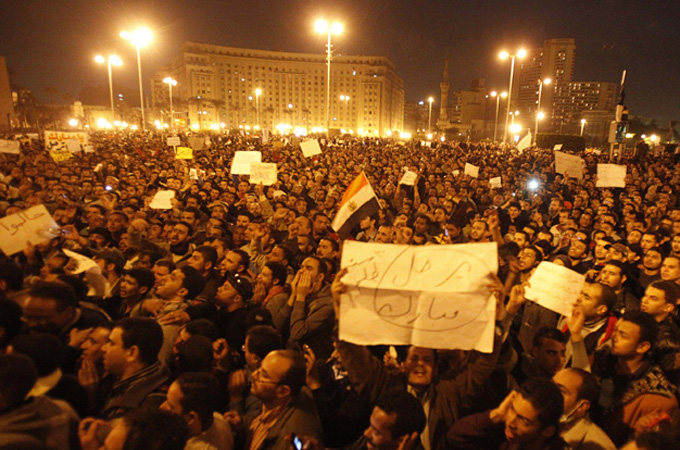EU warns Egypt over protests
Bloc calls for ‘peaceful and open dialogue’ between government and protesters who have ‘legitimate grievances’.

 |
| Protests across Egypt urging Hosni Mubarak to step down have been continuing for six days [Reuters] |
EU foreign ministers have called for “peaceful dialogue” in Egypt as ongoing mass protests against the government continue.
Catherine Ashton, the bloc’s foreign affairs chief, also sought at a meeting in Brussels, the Belgian capital on Thursday, to assure Egypt that it would continue to provide international support.
“There needs to be a peaceful dialogue, an open dialogue to actually move forward,” she said on Monday.
“We have worked closely with Egypt over many years to offer international support and we will be there for the short, medium and long term to help build democracy, the rule of law, all of those values coming into action.”
Ashton said that the “legitimate grievances” of Egyptians should be heeded and that it was for the people of Egypt to determine their future and future leadership.
She said that it was not the EU’s role to tell Egyptians what to do.
Trinidad Jimenez, Spain’s foreign minister, added that the EU supports the “people who are in the street”.
“We support the claiming in the street for more reforms and more rights,” he said.
Concern over economy
Britain separately warned Egypt that repression of anti-government protests would “end badly” but did not call for Mubarak to stand aside.
“It’s sensible to say that you do have a choice here, this repression, if you opt for that, that will end badly for Egypt, badly for the world,” David Cameron, the British prime minister, said.
Earlier, Franco Frattini, Italy’s foreign minister, urged Egyptians to “choose democracy and civil rights, not extremism, not radicalism”.
Despite having usually close ties to Egypt the bloc has sought to distance itself from Hosni Mubarak, the president, and his adminstration. However it has been criticised for not being bolder or more direct towards the Egyptian leader.
Foreign ministers have urged Mubarak to embark on reform in his country but stopped short of demanding he leave.
The impact of the protests on the Egyptian economy are of concern to Europe, with fears that rising energy prices could hit the region’s economic recovery.
“It’s not just oil that Egypt is important for, albeit not as a producer but as a supply conduit,” Dan Lewis, a UK based Energy Analyst, said.
“What’s really interesting is that eight perc ent of global seaborn trade goes through the Suez Canal and if that were to shut down what this means is seaborne trade will take 18 days longer reach Europe and ten days longer to reach America.”
Assistance in Tunisia
“We cannot export revolution,” said Jean Asselborn, Luxembourg’s foreign minister said.
“I’m certain the European Union today will signal to people of good will in Egypt and Tunisia that we’re ready to help organise elections, but not to interfere.”
Ministers moved on Monday to freeze the assets of Zine El Abidine Ben Ali, the ousted Tunisian president, and his wife.
The sanctions could be extended to other people considered to have misappropriated state funds.
Brussels will host the North African nation’s new foreign minister on Tuesday, where Catherine Ashton, is expected to offer assistance in organising elections in Tunisia.
The EU is also expected to look at ways to offer better trade terms to Tunisia to strengthen the country’s economy.
“Since the events in Tunisia, I am following with great attention the developments in the region,” Herman Van Rompuy, the EU president, said this weekend.
Italy’s Frattini said he would eventually like the EU to send a high-level delegation to all countries across the Mediterranean facing “disorders”.
“A mission to hear, to encourage, not to dictate,” he said.